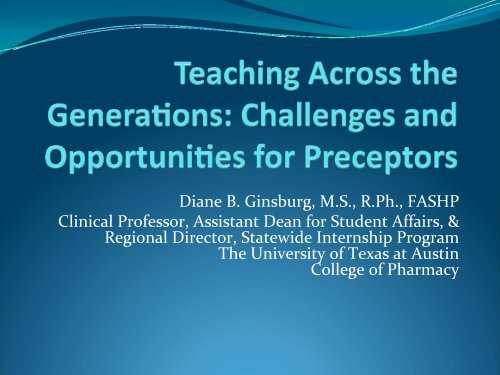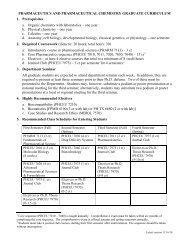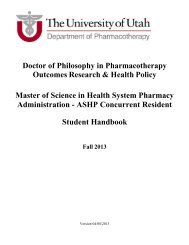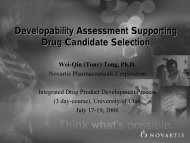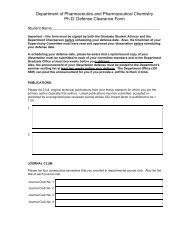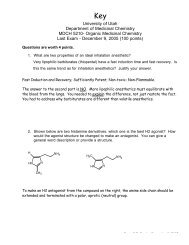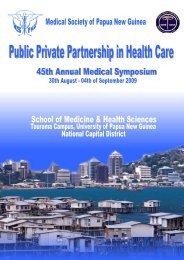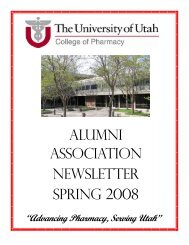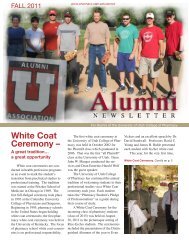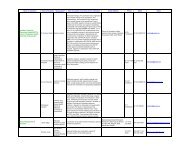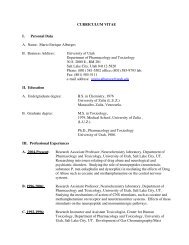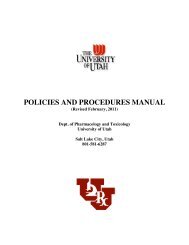Teaching Across the Generations - College of Pharmacy
Teaching Across the Generations - College of Pharmacy
Teaching Across the Generations - College of Pharmacy
You also want an ePaper? Increase the reach of your titles
YUMPU automatically turns print PDFs into web optimized ePapers that Google loves.
Diane B. Ginsburg, M.S., R.Ph., FASHP<br />
Clinical Pr<strong>of</strong>essor, Assistant Dean for Student Affairs, &<br />
Regional Director, Statewide Internship Program<br />
The University <strong>of</strong> Texas at Austin<br />
<strong>College</strong> <strong>of</strong> <strong>Pharmacy</strong>
Today’s Agenda<br />
• “My Generation”<br />
• What are “Millennials”<br />
• Strategies for teaching across generations<br />
• Effective communication skills<br />
• Case studies
Learning Objectives<br />
• Identify characteristics <strong>of</strong> <strong>the</strong> millennial generation<br />
• Discuss <strong>the</strong> strategies for teaching across generations<br />
• Develop methods for effective communication with<br />
students, residents, and peers
Self Assessment Questions<br />
• Do millennial learners prefer subjective to objective<br />
tests<br />
• Technology and <strong>the</strong> digital age has made it harder for<br />
scholastic dishonesty by Millennials (true/false).<br />
• Millennials have difficulty adapting due to <strong>the</strong><br />
involvement <strong>of</strong> <strong>the</strong>ir parents (true/false).<br />
• Peer pressure plays no role in Millennial identify<br />
development (true/false).
Some ground rules…<br />
• Overgeneralizations will be rampant<br />
• No judgments, just characteristics<br />
• Ask questions, share examples, no whining ☺
Understanding <strong>Generations</strong><br />
• Never before has <strong>the</strong>re been a workforce and<br />
workplace so diverse in race, gender, and ethnicity<br />
• We have four (or more) generations working side‐byside<br />
in <strong>the</strong> workplace for <strong>the</strong> first time in history<br />
• All have unique experiences and attributes which<br />
influence <strong>the</strong>ir attitudes towards work
Understanding <strong>Generations</strong><br />
• A group <strong>of</strong> people defined by age boundaries<br />
• Those who were born during a certain era and share<br />
similar experiences growing up.<br />
• They have common cultural or social characteristics<br />
and attitudes.<br />
• Their values and attitudes, particularly about workrelated<br />
topics, tend to be similar, based on <strong>the</strong>ir shared<br />
experiences during <strong>the</strong>ir formative years.
Understanding <strong>Generations</strong><br />
• Psychologists, sociologists, and everyday managers<br />
have identified important differences between <strong>the</strong>se<br />
generations in <strong>the</strong> way <strong>the</strong>y approach<br />
• Work<br />
• Work‐life balance<br />
• Employee loyalty<br />
• Authority
Generational Issues<br />
• A lack <strong>of</strong> understanding across generations can have<br />
detrimental effects on communication and working<br />
relationships and undermine effective services.<br />
• Significant impact on student learning
<strong>Generations</strong> by Year <strong>of</strong> Birth<br />
• The Lost Generation (1883‐1900)<br />
• The G.I Generation (1901‐1924)<br />
• The Silent Generation (1925‐1942)<br />
• The Boom Generation (1943‐1960)<br />
• Generation X (1961‐1981)<br />
• The Millennial Generation (1982‐2001)<br />
• The Homeland Generation (2001‐)<br />
Howe, N., Strauss, W. Millennials Go to <strong>College</strong>
Silent Generation<br />
• Formative Lifetime Events:<br />
• Great Depression, FDR’s New Deal, WWII, Korean War<br />
• Knowledge and Work Heroes<br />
• Jack Welch, Lee Iacocca<br />
• Work Themes<br />
• Loyalty, Hierarchy, Respect for Authority, Discipline,<br />
Conformity, Boundaries, Duty, Consistency and<br />
Uniformity
Baby Boomers<br />
• Formative Lifetime Events<br />
• Man on <strong>the</strong> moon, Civil Rights Movement, Martin Lu<strong>the</strong>r<br />
King, Jr., Women’s Liberation Movement, JFK Assassination,<br />
Cuban Missile Crisis, Vietnam War, Watergate<br />
• Knowledge and Work Heroes<br />
• Bill Gates, Steve Jobs<br />
• Work Themes<br />
• Involvement, Workaholism, personal gratification and goal<br />
attainment, promotion <strong>of</strong> equality, redefining everything,<br />
desire to please, workarounds to meet <strong>the</strong>ir needs, social<br />
consciousness
Generation X<br />
• Formative Lifetime Events<br />
• Energy Crisis, PC’s, Computer Gaming, Reagan era, Berlin<br />
Wall falling, Challenger Disaster, Rodney King, OJ Simpson,<br />
WTC attacks<br />
• Knowledge and Work Heroes<br />
• Jeff Bezos (Amazon.com), Jerry Yang and David Filo<br />
(Yahoo.com), Larry Page and Sergey Brin (Google.com), Jeff<br />
Skoll (eBay.com)<br />
• Work Themes<br />
• Self‐reliance, Focused on building skill portfolio, “Work to<br />
live, don’t live to work”, non‐traditional orientation about<br />
time and space, unimpressed by authority/hierarchy,<br />
skepticism, adventurous, tech savy
Generation Y aka “Millennials”<br />
• Formative Lifetime Events<br />
• Oklahoma City Bombing, Clinton/Lewinsky scandal,<br />
Internet, Columbine, 9/11<br />
• Knowledge and Work Heroes<br />
• Sean Fanning (Napster), Tom Anderson (MySpace.com)<br />
• Work Themes<br />
• Re‐emerging, self curious, life‐long learning/intellectual<br />
curiosity, smart work/problem solving, team work,<br />
uninhibited communication, emotional literacy, holistic<br />
lifestyle, technology dependent
Valuing Generational Differences<br />
Strengths<br />
Silent Boomers Gen‐Xers Millennials<br />
•Loyal<br />
•Honors/Resp<br />
ects<br />
•Follows<br />
orders<br />
•Rewards later<br />
•Practical<br />
•Sacrifice<br />
•Loyal<br />
•Optimistic<br />
•Reasonable<br />
and dedicated<br />
•Team player<br />
•Workaholic<br />
•Adaptable to<br />
change<br />
•Technoliterate<br />
•Self‐starters<br />
•Global<br />
mindset<br />
•Informal<br />
•Goal‐oriented<br />
•Techno‐savvy<br />
•Collaboration<br />
and<br />
achievement<br />
•Optimistic<br />
•Moral<br />
mindset<br />
•Social<br />
activism<br />
Problems<br />
•Prefers<br />
structure<br />
•Technologychallenged<br />
•Set in ways<br />
•Difficulty<br />
•Enjoys much<br />
recognition<br />
•Elder care<br />
absences<br />
•Selfgratification<br />
•Skeptical<br />
•Feel o<strong>the</strong>rs<br />
owe <strong>the</strong>m<br />
•Motivation<br />
•Child care<br />
absences<br />
•Requires<br />
supervision<br />
and support<br />
•Sociable
Learning Characteristics<br />
Silent Boomers Gen‐X<br />
•left‐brain/logical •interactive<br />
•learn by doing<br />
•consistency & logic<br />
appreciated<br />
•computers are<br />
sometimes more trouble<br />
than <strong>the</strong>y are worth<br />
•written materials in<br />
summary form<br />
•interested in problemsolving<br />
•computers can<br />
streamline inefficiencies<br />
•written materials<br />
organized for a quick<br />
scan, but also includes<br />
details<br />
•enjoy role‐playing,<br />
willing to jump in and try<br />
•enhanced computer<br />
skills, make <strong>the</strong> computer<br />
do what you need it to do<br />
•Written materials with<br />
bullets, graphics, quotes<br />
Alvarado, C. The University <strong>of</strong> Texas at Austin
Millennial Minds…<br />
• Soviet Union never existed<br />
• Reality shows have always been on television<br />
• Been able to watch wars and revolutions live<br />
• Pr<strong>of</strong>essional athletes have always competed in <strong>the</strong><br />
Olympics<br />
Alvarado, C. The University <strong>of</strong> Texas at Austin
Core Traits <strong>of</strong> Millennials<br />
• Special<br />
• Sheltered<br />
• Confident<br />
• Team‐Oriented<br />
• Conventional<br />
• Pressured<br />
• Achieving<br />
Howe, N., Strauss, W. Millennials Go to <strong>College</strong>
Implications for Educators<br />
• Need constant feedback to reinforce <strong>the</strong>ir specialness<br />
• High expectations <strong>of</strong> relationship with and availability<br />
<strong>of</strong> faculty<br />
• More risk‐averse than previous generations, especially<br />
intellectual risks<br />
• Less comfortable working independently<br />
• Expect non‐stop interactions with <strong>the</strong>ir peers,<br />
comfortable with virtual communities<br />
• Peer opinion is very important<br />
Alvarado, C. The University <strong>of</strong> Texas at Austin
Implications for Educators<br />
• Count on adults to “walk <strong>the</strong>ir talk”<br />
• Need clear instructions on what kind <strong>of</strong> help is<br />
acceptable or not in <strong>the</strong>ir learning experiences<br />
• Perform tasks in which <strong>the</strong>y can measure <strong>the</strong>ir<br />
objective progress<br />
• Big projects or sustained engagement is really<br />
challenging<br />
• First post stone‐age generation from whom writing<br />
has never centered on a pen and paper<br />
Alvarado, C. The University <strong>of</strong> Texas at Austin
How does your current style compliment/conflict with<br />
millennial traits
Dealing with Generational Differences<br />
Bridging Differences<br />
•Identify Values<br />
•Assess value differences<br />
•Acknowledge implications<br />
•Change behaviors<br />
•Communicate needs<br />
•Build on commonalities<br />
•Accept differences<br />
•Tap into motivations<br />
Manage Differences<br />
•Set clear goals<br />
•Share a common purpose<br />
•Expect mutual accountability<br />
•Give real recognition
Communication<br />
• Be conscious <strong>of</strong> verbal and nonverbal messages<br />
• Communication medium is important, e.g. text,<br />
Facebook, e‐mail, etc.<br />
• “Knowledge is Power!”
Strategies for Success<br />
• Be clear and specific with expectations<br />
• Don’t assume millennials know how to behave in<br />
pr<strong>of</strong>essional situations<br />
• Give guidelines on <strong>the</strong> use <strong>of</strong> technology
Cases<br />
• Three interns are doing a rotation in your pharmacy.<br />
The intern that has been assigned to you is frequently<br />
late, arriving 20‐30 minutes after <strong>the</strong> o<strong>the</strong>r interns.<br />
The o<strong>the</strong>r interns feel like your student is getting<br />
away with doing less work and are complaining to<br />
<strong>the</strong>ir preceptors and o<strong>the</strong>r staff. How would you<br />
handle this situation What are <strong>the</strong> generational<br />
issues associated with this case
Cases<br />
• An intern at your site feels that <strong>the</strong>ir preceptor is “out to get<br />
<strong>the</strong>m!” Everything he does is wrong, and he is concerned he<br />
is going to fail <strong>the</strong> rotation. You know <strong>the</strong> preceptor has very<br />
high standards and can be tough on students. The rotation<br />
did not start well for <strong>the</strong> intern; however, you know that his<br />
performance has improved. As <strong>the</strong> director <strong>of</strong> pharmacy,<br />
what would you do in this situation What are <strong>the</strong><br />
generational issues associated with this case
Cases<br />
• A student on your anticoag rotation is having a<br />
difficult time handling <strong>the</strong> patient load and providing<br />
answers to basic <strong>the</strong>rapeutics questions. He has<br />
documented some information incorrectly in <strong>the</strong><br />
patient’s chart. You are concerned that patient care<br />
may be compromised an he may jeopardize<br />
pharmacy’s relationship with <strong>the</strong> clinic. What do you<br />
do What are <strong>the</strong> generational issues associated with<br />
this case
Cases<br />
• You notice that <strong>the</strong> student in your pharmacy is<br />
frequently sitting around and only does things when<br />
she is asked. Every time you see her she is texting or<br />
updating her status on Facebook. You overheard <strong>the</strong><br />
student saying to one <strong>of</strong> your technicians that she has<br />
no desire to practice in this type <strong>of</strong> environment, she<br />
is just “doing her time” in your pharmacy. What do<br />
you do What are <strong>the</strong> generational issues associated<br />
with this case
Summary<br />
• Working with multiple generations<br />
• Understanding is key!<br />
• Be clear in your communications and verify<br />
understanding<br />
• Recognize what you bring to <strong>the</strong> situation<br />
• Relax :)
Thank you!<br />
• dbgbox@mail.utexas.edu<br />
• (512) 471‐3631
Answers to Questions<br />
• Millennial learners prefer subjective to objective tests.<br />
(False)<br />
• Technology and <strong>the</strong> digital age has made it harder for<br />
scholastic dishonesty by Millennials (False).<br />
• Millennials have difficulty adapting due to <strong>the</strong><br />
involvement <strong>of</strong> <strong>the</strong>ir parents (True).<br />
• Peer pressure plays no role in Millennial identity<br />
development (False).


